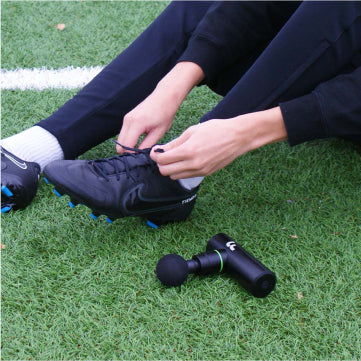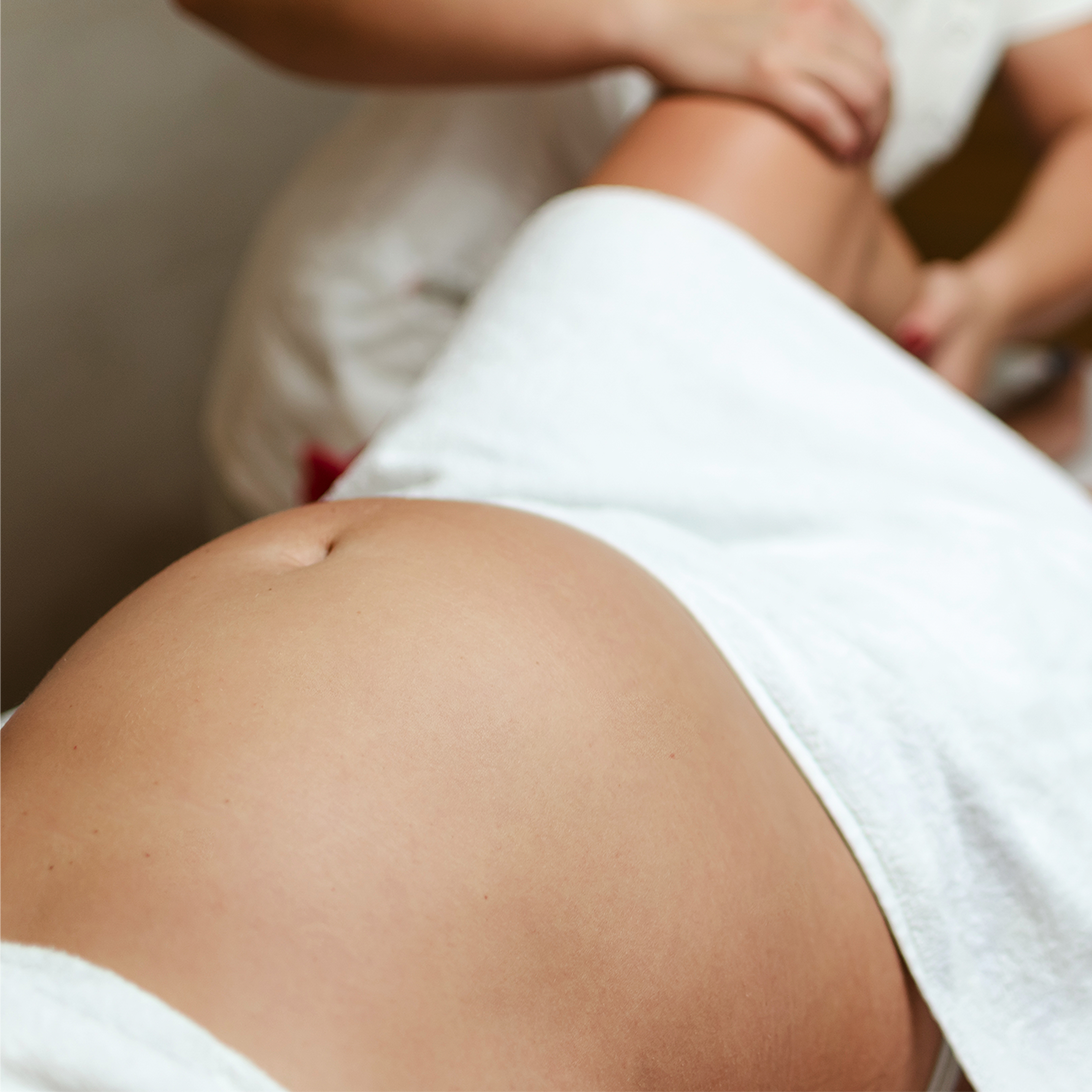Restless legs syndrome in pregnant women is a common and often uncomfortable condition that can cause significant disruption to sleep.
It is estimated that up to 15% of pregnant women experience restless legs syndrome, which can be especially bothersome in the third trimester of pregnancy.
The exact cause of restless legs syndrome in pregnant women is unknown, but it is believed to be related to hormonal changes and iron deficiency.
It is often accompanied by a compulsive and irresistible need to move your legs and sometimes comes along with tingling, burning, or itching sensations. While there is no cure for restless legs syndrome (RLS), there are several ways to manage it during pregnancy.
In this article, we will cover some tips to help you manage and reduce the symptoms of RLS during pregnancy. But first, let's examine how this medical condition affects pregnant women.
Understanding the Impact of Restless Legs Syndrome on Pregnant Women
The impact of RLS on pregnant women can be significant. It can lead to sleep deprivation, which can have a negative effect on the health of both mother and baby.
It can also cause fatigue, irritability, and difficulty concentrating. In addition, it can interfere with daily activities such as work or leisure activities. Let's look at how these factors play a role in affecting pregnant women with RLS.
1. Sleep disruption
Restless legs syndrome can cause significant disruption to sleep during pregnancy.
It is often accompanied by an irresistible urge to move the legs, making it difficult to fall asleep or stay asleep at night. Without enough sleep, it can be difficult to cope with the physical and emotional demands of pregnancy.
Pregnant women with restless legs syndrome are also more likely to suffer from insomnia, which can further disrupt sleep. With chronic sleep disorders during pregnancy, the risks of preterm labor, low birth weight, and other difficult delivery complications will be high.
2. Fatigue
Feeling tired and exhausted is a common symptom of restless legs syndrome during pregnancy.
This can be due to the lack of sleep caused by RLS and the physical strain of carrying a baby. For pregnant women, this can lead to a general feeling of being overwhelmed and irritable.
Furthermore, fatigue comes with a lack of energy, so it cannot be easy to complete daily tasks and activities.
3. Depression
Pregnant women with restless legs syndrome are more likely to suffer from depression than those without it.
This is due to the lack of sleep, fatigue, and other symptoms associated with RLS. Pregnant women with RLS need to seek help from a mental health professional if they feel depressed.
4. Irritability
Pregnant women with restless legs syndrome may also experience increased levels of irritability due to lack of sleep and fatigue.
Irritability occurs when a person is easily frustrated or angered and can make it difficult to cope with the demands of pregnancy. It can also lead to conflict with family and friends.
If you are easily irritated or frustrated, taking a break and practicing relaxation techniques such as deep breathing or yoga can be helpful.
5. Pain
Restless legs syndrome can also cause pain in pregnant women.
This pain can range from mild to severe and can be accompanied by tingling, burning, or itching sensations in the lower limbs. Tingling sensations can be especially uncomfortable and make it difficult to get comfortable or sleep.
Itching sensations can also be bothersome and can make it difficult to relax. It is important to note that these painful sensations can be worse at night and make it difficult to get a good night's sleep.
Now that you know how restless legs syndrome can affect women during pregnancy, it is important to seek help from a medical professional if you feel you are suffering from this condition. Let's look at what signs and symptoms to look out for and how to get help.
Signs and Symptoms of Restless Legs Syndrome in Pregnant Women
Restless legs syndrome symptoms can be difficult to diagnose in pregnant women, as they often present signs similar to other health conditions.
Most times, the symptoms will be worse at night and can include the following:
1. An urge to move your legs, especially when you are lying down or sitting still
If you have restless legs syndrome during pregnancy, you may experience an overwhelming urge to move your legs.
This sensation is often described as a crawling, tingling, or itching feeling that can be difficult to ignore. It is usually worse when lying down or sitting still for long periods. You may find yourself constantly shifting positions to relieve the discomfort. If this sounds familiar, it may be a sign of restless syndrome.
2. Uncomfortable sensations in your legs, such as tingling, burning, or itching
Another way you can tell if you have restless legs syndrome during pregnancy is if you experience uncomfortable sensations in your legs.
These can include tingling, burning, or itching sensations that are difficult to ignore and can be made worse by lying down or sitting still.
These uncomfortable sensations can be mild to severe and often worsen when lying down or sitting still for long periods. They may also be accompanied by an irresistible urge to move your legs to relieve discomfort.
If you experience any of these sensations, it may be a sign of restless legs syndrome.
3. Difficulty sleeping due to the need to constantly move your legs
One of the most common symptoms of restless legs syndrome is difficulty sleeping due to the need to constantly move your legs.
This can be especially disruptive for pregnant women, as sleep is often disrupted due to hormonal changes and other physical discomforts. If you have RLS, you may find yourself waking up frequently throughout the night due to the need to move your legs.
That's just how you can tell if you have restless legs syndrome during pregnancy.
4. Worsening of symptoms at night or when you are resting
Another way to tell if you have restless syndrome during pregnancy is if any of the symptoms mentioned above worsen at night or when you are resting.
This can make it difficult to get a good night's sleep, as the urge to move your legs and uncomfortable sensations can be more intense when lying down or sitting still for long periods. When this happens, pregnant women may constantly shift positions to relieve the discomfort.
It can also lead to chronic sleep disorders, as a lack of sleep can take its toll.
These are just some of the signs and symptoms that may indicate you have restless legs syndrome during pregnancy. They usually manifest during the second and third trimesters but can also occur earlier in the pregnancy.
5. Difficulty concentrating
Finally, restless legs syndrome can also lead to difficulty concentrating.
This can make it difficult to focus on tasks or activities that require mental effort. It can also lead to forgetfulness and difficulty making decisions.
For pregnant women, this can be especially problematic as they need to stay focused on their health and their baby's health.
If you are experiencing any of these symptoms, you must speak to your doctor as soon as possible. They can help you determine what is causing your symptoms and provide you with the best treatment plan for your needs.
Now, look into factors that can result in restless legs syndrome during pregnancy.
Possible Causes of Restless Legs Syndrome in Pregnant Women
Restless legs syndrome can be caused by a variety of factors that include hormonal changes, nutritional deficiencies, and even certain medications.
These factors can differ from person to person, so it is important to speak to your doctor so as to determine the cause of your symptoms. Let's look at each of them in more light.
1. Being pregnant with multiple babies
Being pregnant with multiple babies can increase the risk of developing restless legs syndrome. This is because the body to undergo more strain to support multiple babies, which can lead to an imbalance in hormones and other bodily functions.
This can cause restless legs syndrome in pregnancy on the grounds of increased stress and fatigue. It is important to talk to your doctor if you are pregnant with multiples and experiencing RLS symptoms. They may be able to recommend lifestyle changes or medications that can help manage the symptoms.
2. Hormonal changes
Pregnant women are more prone to suffer from restless leg syndrome due to the hormonal changes that occur during pregnancy.
During pregnancy, the body undergoes various hormonal shifts that can affect the nervous system and cause RLS symptoms. These hormones include estrogen, progesterone, and relaxin.
Estrogen is known to increase nerve sensitivity, which can lead to an overwhelming urge to move your legs. Progesterone, on the other hand, can cause muscle spasms and cramps due to its effect on the nervous system. Relaxin, released during pregnancy to help relax the ligaments and joints, can also contribute to symptoms of restless legs syndrome.
If you are experiencing RLS during your pregnancy, it is important to talk to your doctor about the possibility of hormonal changes being the cause. That way, they can help you manage the symptoms and keep them under control.
3. Iron deficiency
Another common cause of restless legs syndrome in pregnant women is iron deficiency.
Iron is an essential mineral that helps the body produce red blood cells and transport oxygen.
The role of iron is also important for the production of dopamine, a neurotransmitter that helps regulate movement. Low levels of dopamine can lead to an irresistible urge to move your legs. In pregnant women, getting enough iron can be especially difficult due to increased blood volume and the growing baby's demands.
If you are experiencing RLS during pregnancy, it is important to talk to your doctor about the possibility of iron deficiency being the cause. It affects up to 20% of pregnant women and can be easily treated with iron supplements.
4. Vitamin deficiencies
Certain vitamin deficiencies, such as B12 or Folate, can also contribute to restless legs syndrome in pregnancy.
Vitamin B12 helps the body produce red blood cells and is important for nerve function, while Folate helps the body produce new cells and is important for healthy fetal development.
Iron and folate deficiencies can lead to an imbalance in the nervous system and cause RLS symptoms. For pregnant women, it is even more important to ensure they are getting enough of these vitamins as they are essential for the health of both mother and baby.
If you are experiencing RLS during pregnancy, it is important to talk to your doctor about the possibility of vitamin deficiencies being the cause.
They can help you determine if you need to take supplements or make dietary changes to get enough of these vitamins.
5. Dehydration
Dehydration can also contribute to restless legs syndrome in pregnancy.
When the body is dehydrated, it can lead to an imbalance in electrolytes and minerals, which can affect nerve function and result in periodic limb movements as well as other symptoms of restless leg syndrome.
During pregnancy, dehydration can be even more of a concern due to increased water retention and the growing baby's demands. It is important to ensure you are drinking enough water throughout the day to stay hydrated.
Moreover, certain beverages, such as coffee and alcohol, can act as diuretics and cause dehydration. Limiting your intake of these drinks if you are experiencing RLS during your pregnancy is important.

6. Taking caffeine
Consuming caffeine in large amounts can also lead to restless legs syndrome in pregnant women.
A stimulant in nature, caffeine causes restless legs syndrome by increasing the nervous system's activity. This can lead to increased sensitivity in the legs, making it difficult for pregnant women to relax and get a good night's sleep.
Caffeine also has a diuretic effect, which can lead to dehydration and electrolyte imbalances. This can further worsen symptoms of restless legs syndrome in pregnant women, which is why limiting caffeine intake during pregnancy is important.
7. Drinking alcohol
Alcohol consumption can also cause restless legs syndrome in pregnant women.
Alcohol is a depressant that can interfere with the body's natural sleep-wake cycle and imbalance dopamine levels.
This can make it harder for pregnant women to relax and get a good night's sleep, leading to RLS symptoms. Moreover, alcohol is a diuretic that can lead to dehydration and electrolyte imbalances, further worsening RLS symptoms.
These are just some possible causes of restless legs syndrome in pregnant women. It's important to talk to your doctor if you are experiencing RLS symptoms during pregnancy so that they can help you determine the cause.
In certain cases, RLS can be a sign of underlying medical conditions or certain things that may put you in a higher risk category for RLS. Let's go over some of them and how they contribute to RLS.
Medical Conditions That Can Trigger Restless Legs Syndrome while Pregnant
Medical conditions can also cause restless legs syndrome in pregnant women. Certain medical conditions, such as anemia, diabetes, and kidney disease, can lead to an imbalance in dopamine levels, making it harder for pregnant women to relax and get a good night's sleep.
Let's look at how these medical conditions contribute to restless legs syndrome in pregnant women.
1. Anemia
Anemia is a condition in which the body does not have enough healthy red blood cells to carry oxygen throughout the body. This can lead to an imbalance in dopamine levels, making it harder for pregnant women to relax and get a good night's sleep.
Pregnant women with anemia may also experience symptoms of restless legs syndrome, such as an urge to move the legs, tingling or unpleasant sensations in the legs, and difficulty falling asleep.
2. Diabetes
Diabetes is a health condition that manifests when the body does not produce enough insulin or cannot use the insulin it produces effectively. It can cause an imbalance in dopamine levels, leading to restless legs syndrome in pregnant women.
Diabetes can also come with other symptoms, such as excessive thirst, frequent urination, and fatigue during pregnancy. One way to manage diabetes is to maintain a healthy diet and exercise regularly.
3. Kidney-related diseases
Having kidney disease can also lead to an imbalance in dopamine levels, making it harder for pregnant women to relax and get a good night's rest.
It makes it more difficult for the body to filter out toxins, accumulating waste products in the blood. This can cause symptoms of restless legs syndrome in pregnant women.
4. Parkinson's disease
Parkinson's disease is a neurological disorder that affects movement and can cause an imbalance in dopamine levels, leading to restless legs syndrome in pregnant women. Symptoms of Parkinson's disease include tremors, stiffness, and difficulty with balance and coordination.
Pregnant women with Parkinson's disease may also experience symptoms of restless legs syndrome, such as an urge to move the legs, tingling or unpleasant sensations in the legs, and difficulty falling asleep.
While these medical conditions can contribute to restless legs syndrome in pregnant women, other factors can also play a role.
Other Risk Factors for Restless Legs Syndrome in Pregnant Women
In addition to medical conditions, other risk factors can lead to restless legs syndrome in pregnant women. These risk factors may seem unrelated, but they can all contribute to an imbalance in hormones and neurotransmitters, making it harder for pregnant women to relax.
Some of them include the following:
1. Being overweight or obese
Being overweight or obese is a risk factor for restless legs syndrome in pregnant women. This is because being overweight causes an imbalance in hormones, which can lead to an imbalance in dopamine levels.
Moreover, being overweight can also lead to other medical conditions, such as diabetes and anemia, which can further contribute to restless legs syndrome.
2. Lack of exercise
Pregnant women who don't get enough exercise can also be at risk for restless legs syndrome.
Light exercises like walking, swimming, and yoga help to promote circulation and can help to reduce muscle tension, which can help to relieve symptoms of restless legs syndrome.
Without regular exercise, pregnant women will also be more likely to experience fatigue and insomnia, which can worsen symptoms.
3. Being under stress or having anxiety
Symptoms of restless legs syndrome can also be exacerbated by stress and anxiety.
During pregnancy, it is normal to experience a certain amount of stress and anxiety due to the physical and emotional changes that come with it. However, if these feelings become overwhelming, they can lead to an imbalance in the nervous system and cause restless legs syndrome in pregnancy.
That's why it's important to find ways to manage stress and anxiety during pregnancy. It can also be helpful to talk to a therapist or counselor if you are feeling overwhelmed.
Sometimes, your doctor may also recommend medications to help manage stress and anxiety. However, talking to your doctor before taking any medications during pregnancy is important.
4. Smoking cigarettes
Smoking during pregnancy is a major risk factor for restless legs syndrome in pregnant women.
It can lead to an imbalance in dopamine levels, which can cause symptoms of restless legs syndrome.
Nicotine found in cigarettes can also cause an increase in blood pressure, which can further contribute to restless legs syndrome in pregnant women. Moreover, taking in nicotine during pregnancy can also lead to other health complications for both the mother and baby.
It has been found that smoking up to 10 cigarettes a day can increase the risk of restless legs syndrome in pregnant women. Therefore, it is important to quit smoking during pregnancy to reduce the risk of developing restless legs syndrome
5. Taking certain medications
One more possible cause of restless legs syndrome in pregnant women is taking certain medications.
Certain medications, such as antidepressants and antipsychotics, can interfere with the body's natural sleep-wake cycle. Antidepressants are known to cause an increase in serotonin levels which can make pregnant women more sensitive to RLS symptoms.
Antipsychotics, on the other hand, can cause an imbalance in dopamine levels and can lead to restless legs syndrome, making it harder for pregnant women to relax and get a good night's sleep. In pregnant women, it is important to talk to your doctor about any medications you are taking and their potential side effects.
6. Having a family history of restless legs syndrome
A family history of restless legs syndrome can also be a risk factor for this medical condition in pregnant women. This is because genetics can play a role in the development of RLS. This common condition is often inherited from a parent or grandparent.
Inheriting the condition can make it more likely for pregnant women to experience restless legs syndrome during their pregnancy.
So, there you have it, some of the potential causes of restless legs syndrome in pregnant women. From medical conditions to lifestyle habits and more, these can all contribute to the development of this condition.
To help manage restless legs syndrome while pregnant, it is important to talk to your doctor about any potential causes and treatments. However, you can also take some steps to manage your condition to help reduce the symptoms.
Let's look at ways you can do that.
Treating Restless Leg Syndrome While Pregnant
Treating restless leg syndrome during pregnancy can be achieved through lifestyle changes and medications. However, speaking to your doctor before taking any medications is important, as some may not be safe for use during pregnancy.
Lifestyle changes such as eating healthy, avoiding alcohol, and massage can also help to manage restless legs syndrome. Let's look at some of the treatments in more detail.
1. Avoid caffeine and alcohol
Caffeine and alcohol can both make restless legs syndrome symptoms worse during pregnancy.
Caffeine is a stimulant that can increase muscle tension and make it harder to fall asleep, while alcohol can interfere with your quality of sleep leading to common sleep disorders.
It is best to avoid caffeine and alcohol altogether if you are experiencing RLS during pregnancy. Instead of caffeine and alcohol, try drinking herbal teas or warm milk before bed. These can help relax your body and make it easier to fall asleep.
If you do choose to consume caffeine or alcohol, try to limit your intake and avoid drinking close to bedtime.
2. Get enough rest
Getting enough rest is essential for managing restless legs syndrome during pregnancy. Make sure to get at least seven to eight hours of sleep each night and take regular naps throughout the day if needed to improve your sleep quality.
It is also important to create a comfortable sleeping environment by using pillows and blankets that provide support and comfort.
Additionally, avoid activities that can cause stress or anxiety before bedtime, such as watching television or using your phone.

3. Practice relaxation techniques such as deep breathing, meditation, and visualization
Relaxation techniques such as deep breathing, meditation, and visualization can help manage restless legs syndrome during pregnancy.
Deep breathing helps to reduce stress and tension in the body, while meditation and visualization can help to focus the mind on calming thoughts. To practice deep breathing, sit or lie in a comfortable position and take slow, deep breaths. Focus on your breath as it enters and leaves your body.
Meditation and visualization involve focusing on a calming image or thought. You can use guided meditations or create your own visualization to help you relax.
4. Perform light exercises such as stretching, yoga, and walking
Regular exercise can help reduce the symptoms of restless legs syndrome during pregnancy.
Low-impact activities such as walking, swimming, and yoga are all great options for pregnant women. You can walk for at least 30 minutes daily to help reduce restless legs syndrome symptoms.
If you are feeling particularly uncomfortable, you can also try light stretching exercises to help relax your muscles. Talking to your doctor before starting any new exercise routine during pregnancy is important.
5. Take warm baths or use a heating pad to relax your muscles before bedtime
Taking a warm bath or using a heating pad can help relax tense muscles and improve circulation in the legs, which can help reduce the symptoms of RLS.
When using a heating pad, it is important to be careful not to overheat your legs. It is best to use lukewarm water for warm baths and avoid soaking for too long.
If you feel any discomfort or pain while using a heating pad or taking a hot bath, it is important to stop immediately. Try to find a temperature that is comfortable for you.
6. Use an ice pack or cold compress to reduce inflammation
Using an ice pack or cold compress can help reduce inflammation and pain in the legs.
To use a cold compress, wrap a few ice cubes in a towel and apply it to the affected area for 10-15 minutes. You can also try using an ice massage by rubbing an ice cube over the affected area for 5-10 minutes. This can help reduce muscle tension and inflammation.
It is important to avoid using cold compresses for too long as this can cause skin irritation.
7. Get a massage
Massage therapy can be a great way to reduce the symptoms of restless legs syndrome during pregnancy.
Gently massaging your legs and feet can help relax your muscles and reduce the discomfort caused by RLS. You can also use essential oils such as lavender or chamomile to help relax your muscles.
When getting a massage during pregnancy, it is important to ensure the therapist is experienced in working with pregnant women.
They should be aware of any areas that should be avoided and use gentle pressure. With regular massage, you can help reduce the symptoms of restless legs syndrome and improve your overall well-being during pregnancy.
If you don't have access to a massage therapist, you can also opt for home massage techniques. Some include:
Self-massage
Self-massage is a great way to help reduce the symptoms of restless legs syndrome during pregnancy.
Start by finding a comfortable position, either sitting or lying down. Then, use your hands to massage the affected area in slow, circular motions. You can also use a massage ball or foam roller for this purpose.
Focus on areas that feel particularly tense and apply pressure until you feel the tension release. If you experience any pain or discomfort, stop immediately and consult your doctor for further advice.
Repeat this process as often as necessary, but make sure not to overdo it as this could cause more harm than good.
After self-massaging, take some time to relax and stretch out your muscles with gentle yoga poses or other stretching exercises that can help reduce muscle tension and cramping associated with restless legs syndrome during pregnancy.
Acupressure
Acupressure is another try at home massage technique that can be used to reduce the symptoms of RLS during pregnancy. Acupressure involves applying pressure to specific points on the body using your fingers or a tool such as an acupressure mat.
These points are believed to be connected to the body’s energy pathways and applying pressure can help stimulate these pathways and reduce the symptoms of RLS. When using acupressure during pregnancy, it is important to be gentle and avoid applying too much pressure. You should also avoid any points that are located near your abdomen or pelvic area.
If you are unsure about which points to use, consult a qualified acupressure practitioner for further advice.

8. Adjust sleeping positions and pillows
Adjusting your sleeping position and using the right pillows can help reduce the symptoms of restless legs syndrome during pregnancy.
Sleeping on your side with a pillow between your legs can help to improve circulation and reduce discomfort. You may also try sleeping with a body or wedge pillow for extra support.
Using a supportive mattress can also help to reduce the symptoms of RLS. A mattress that is too soft or too firm can cause discomfort and make it difficult to get comfortable.
Now that we have discussed some natural tips for managing restless legs syndrome during pregnancy let's look at some medications that can help.
Managing Restless Legs Syndrome with Medications While Pregnant
Managing restless legs syndrome during pregnancy can be difficult, as many medications are not recommended for pregnant women. However, some medications can help reduce the symptoms of RLS without posing a risk to your baby.
Let's look at some medications that can be used to manage restless legs syndrome during pregnancy.
1. Over-the-counter medications for treating symptoms of RLS
Over-the-counter medications can be a great way to manage the symptoms of restless legs syndrome during pregnancy. Many over-the-counter medications contain ingredients that help to relax muscles, improve circulation, and reduce inflammation.
They are generally considered safe for pregnant women, but it is important to check with your doctor before taking any medication. Some helpful over-the-counter medications for restless legs syndrome include magnesium supplements, calcium supplements, and herbal remedies such as valerian root or chamomile tea.
Magnesium supplements
Pregnant women with restless legs syndrome may benefit from taking a magnesium supplement. Magnesium is an essential mineral that helps to relax muscles and improve circulation. With optimal levels, pregnant will experience fewer symptoms of restless legs syndrome.
Calcium supplements
Calcium is an important mineral for pregnant women, as it helps to support the growth and development of the fetus. Taking a calcium supplement may also help reduce restless legs syndrome symptoms during pregnancy.
Herbal remedies
Herbal remedies such as valerian root or chamomile tea can help manage the symptoms of restless legs syndrome during pregnancy.
Valerian root is known for its calming and relaxing effects, while chamomile tea can help to reduce inflammation and improve circulation. Other remedies, such as lavender oil and ginger tea, may also be beneficial.
2. Prescription medications for treating RLS
Suppose over-the-counter medications are not helping to manage the symptoms of restless legs syndrome during pregnancy. In that case, your doctor may prescribe a medication.
Prescription medications for RLS during pregnancy include dopamine agonists, anticonvulsants, and benzodiazepines. These medications can help to reduce the symptoms of RLS, but it is important to talk to your doctor about any potential risks before taking them.
Dopamine agonist medications
Dopamine is a neurotransmitter that helps regulate movement and sleep. Low levels of dopamine can lead to restless legs syndrome, so medications that increase brain chemical dopamine levels may help reduce symptoms.
The most commonly prescribed dopamine agonists for RLS during pregnancy are ropinirole and pramipexole. This medication can help to reduce the symptoms of RLS, but it can also cause side effects such as nausea, dizziness, and headaches.
It is generally considered safe for use during pregnancy, although limited evidence is available. The American College of Obstetricians and Gynecologists (ACOG) recommends that dopamine agonists be used only if the potential benefits outweigh the risks. It is important to discuss any medications with your doctor before taking them while pregnant, as some medications may have adverse effects on the fetus.
Anticonvulsants
Anticonvulsants are medications that can help to reduce the symptoms of RLS. They work by blocking certain nerve signals that cause the legs to twitch and jerk.
The most commonly prescribed anticonvulsants for RLS during pregnancy are gabapentin and pregabalin. These medications can help to reduce the symptoms of RLS, but they can also cause side effects such as drowsiness, dizziness, and blurred vision.
If you are pregnant, you must talk to your doctor before taking any anticonvulsants. The ACOG recommends using these medications only if the potential benefits outweigh the risks.
Benzodiazepines
Benzodiazepines are prescribed medications that help to reduce anxiety and improve your quality of sleep. They work by increasing the activity of certain neurotransmitters in the brain, which can help to reduce the annoying symptoms of RLS.
The most commonly prescribed benzodiazepine medications for RLS during pregnancy are clonazepam and lorazepam. These medications are generally considered safe for use during pregnancy, although limited evidence is available.
It is important to talk to your doctor before taking any benzodiazepines while pregnant, as some medications may have adverse effects on the fetus.
Muscle relaxants
Muscle relaxants can also be used to help manage restless legs syndrome during pregnancy.
These medications work by relaxing the muscles in the body, which can help reduce symptoms of RLS.
Common muscle relaxants for restless leg syndrome during pregnancy include cyclobenzaprine (Flexeril) and tizanidine (Zanaflex). Cyclobenzaprine can be used safely during pregnancy, although the safety of tizanidine has not been established.
That's why it is important to talk to your doctor before taking any muscle relaxants while pregnant, as some medications may adversely affect the fetus.
Sleep medications
Sleep medications can also be used to help manage restless legs syndrome during pregnancy. These medications work by helping to induce sleep and reduce the symptoms of RLS.
Common sleep medications prescribed for restless leg syndrome during pregnancy include zolpidem (Ambien) and eszopiclone (Lunesta). Zolpidem is generally considered safe for use during pregnancy, although the safety of eszopiclone has not been established.
Speaking to your doctor before taking any medications while pregnant is important, as some may have adverse effects on the fetus.
Opioids
Opioids are a class of drugs that can be used to treat the symptoms of restless legs syndrome during pregnancy. These medications block pain signals in the brain and reduce muscle spasms.
Common opioid medications for RLS during pregnancy include codeine, hydrocodone (Vicodin), and oxycodone (OxyContin). These medications are generally considered safe for use during pregnancy, although the risks should be discussed with your doctor before taking them.
Codeine is the only opioid medication that is approved for use during pregnancy by the FDA. Vicodin and OxyContin should only be used if the potential benefits outweigh the risks.
Using these medications during pregnancy can increase the risk of birth defects, so discussing any medications with your doctor before taking them is important. If you don't want to take medications, some nutritional changes can help to reduce the symptoms of RLS during pregnancy.
Nutritional Considerations for Pregnant Women with Restless Legs Syndrome
Nutrition is an important factor to consider when dealing with restless legs syndrome (RLS) during pregnancy.
Eating a balanced diet with plenty of fresh fruits and vegetables, lean proteins, and whole grains can help provide the body with essential vitamins and minerals that may help reduce symptoms of RLS. Here are some key nutrients that may help manage RLS during pregnancy.
1. Eat foods high in iron
Iron is an important mineral for pregnant women, as it helps to support your baby's growth. It can also help reduce the symptoms of restless legs syndrome in pregnancy.
Iron-rich foods include lean red meat, dark leafy greens, legumes, and fortified cereals. A balanced diet that includes these foods can help you get enough iron.
If your iron levels are low, your doctor may recommend iron supplementation. Supplements help to increase hemoglobin levels, which can help improve circulation and reduce RLS symptoms.
2. Eat vitamin B12-rich foods
Vitamin B12 is important for healthy nerve and brain function and can help reduce symptoms of restless legs syndrome during pregnancy.
Vitamin B12-rich foods include fish, meat, eggs, and dairy products. It can also be found in fortified cereals and nutritional yeast. If you are allergic to these foods, you may need to take a vitamin B12 supplement. Supplements are generally considered safe for pregnant women but should be discussed with your doctor before taking them.
3. Increase your intake of magnesium
Magnesium is an important mineral that helps to regulate muscle contractions and nerve impulses. Low magnesium levels can lead to increased muscle tension and spasms, which can worsen RLS symptoms.
Foods high in magnesium include nuts, seeds, legumes, and dark leafy greens. A balanced diet that includes these foods can help ensure you get enough magnesium.
If your magnesium levels are low, your doctor may recommend a supplement. However, speaking to your doctor before taking any supplements while pregnant is important.
Restless legs syndrome can be a difficult condition to manage during pregnancy. However, eating a balanced diet that includes plenty of fresh fruits and vegetables, lean proteins, and whole grains can help provide the body with essential vitamins and minerals that may help reduce symptoms of RLS.
You can also combine this with other lifestyle changes and fitness tools to help reduce symptoms of restless legs syndrome during pregnancy.
Fitness tools are easy to use and can help to reduce stress, and improve circulation for a healthy pregnancy. Let's look at some popular ones that can help reduce symptoms of restless legs syndrome during pregnancy.
Fitness Tools to Help with Restless Legs Syndrome During Pregnancy
Fitness tools can be a great way to help manage restless legs syndrome during pregnancy.
Combining them with lifestyle changes and dietary modifications can help reduce symptoms while keeping you active. Some fitness tools that are helpful include:
1. Massage gun
Massage guns are handheld devices that are safe and effective in relieving RLS symptoms during pregnancy. They work by vibrating your legs and can help reduce muscle tension and cramping.
Using a massage gun is easy and can be done at home. All you have to do is hold the device against your legs and move it in a circular motion. They can also help relax your blood vessels for better circulation.

2. Foam rollers
Using foam rollers is a great way to relieve severe symptoms of restless legs syndrome during pregnancy.
These cylindrical devices can massage your legs and help reduce muscle tension and cramping.
To use a foam roller, simply place it on the floor and roll your legs over it in a back-and-forth motion. This will help improve circulation and reduce discomfort.
3. Air C pro
Air C pro is another device that can relieve symptoms of restless legs syndrome while pregnant.
These devices work by providing a gentle, continuous stream of air pressure that helps reduce muscle tension and cramping.
To use an Air C pro, simply place it on the floor and move your legs over it in a circular motion. This will help improve circulation and reduce discomfort.
Air C pro devices are easy to use and can be worn on the lower leg or foot. It is also lightweight and comfortable, making it ideal for pregnant women experiencing severe symptoms of restless legs syndrome.

4. Compression wraps
Compression wraps are another helpful way to manage restless legs syndrome during pregnancy.
These wraps provide gentle pressure around the affected area and can help reduce muscle tension and cramping.
To use a compression wrap, wrap it around your legs or feet and adjust the tightness until you feel comfortable. The wrap should be snug but not too tight, which can cause discomfort. Compression wraps can also help improve circulation and reduce fatigue.
5. Exercise ball
Sitting on an exercise ball can help reduce muscle tension and improve circulation. To use an exercise ball, simply sit on it and move your legs in a circular motion. This will help relax your muscles and reduce discomfort.
Exercise balls are also great for pregnant women as they provide support and stability while helping to improve posture. Just make sure to use a ball that is the right size for your body.
6. Yoga mats
Yoga mats are a great way to help manage restless legs syndrome during pregnancy. Not only do they provide a comfortable surface for stretching and exercising, but they can also help reduce muscle tension and cramping.
Yoga mats come in various sizes and thicknesses, so choosing one that is suitable for your body type is important. To use a yoga mat, lie down on it and move your legs in a circular motion. You can also use a yoga mat to do simple stretching exercises that can help reduce symptoms of restless legs syndrome.
7. Resistance bands
Resistance bands can be used to do gentle stretching exercises that help relax the muscles. To use a resistance band, wrap it around your legs or feet and move them in a circular motion. This will help reduce muscle tension and cramping.
Resistance bands are also great for pregnant women as they provide support and stability while helping to improve posture. Just make sure to choose a band that is the right size for your body.
Frequently Asked Questions
This section will answer some of the most common questions about restless legs syndrome during pregnancy. If you have any additional questions, let us know in the comments below.
When should I consult a medical professional about my restless leg symptoms?
When it comes to managing restless legs syndrome during pregnancy, it is important to speak to your doctor if you are experiencing severe symptoms.
Your doctor can advise you on the best treatment options for you and refer you to a specialist if necessary. It is also important to let your doctor know if you are taking any medications or supplements that could be contributing to your symptoms.
When do restless legs symptoms occur in pregnant women?
Restless legs syndrome can start at any point during pregnancy, but it is most common in the second and third trimesters.
Symptoms may be mild or severe, ranging from an uncomfortable sensation in the legs to an irresistible urge to move them.
It is important to talk to your doctor if you experience any of these symptoms during pregnancy, as they may be a sign of an underlying health condition.
Will restless legs syndrome go away after I put to bed?
Restless legs syndrome can persist after birth, but it is usually temporary.
The symptoms may improve or even disappear completely within a few weeks of giving birth. However, if the symptoms persist for longer than this, it is important to seek medical advice.
It is also possible that restless legs syndrome may return during future pregnancies. If this happens, it is important to talk to your doctor about the best medical treatment to manage the condition.
Conclusion
In conclusion, restless legs syndrome is a common neurological disease that can affect pregnant women.
However, there are several ways to manage severe symptoms associated with this health condition. You can start by using a yoga mat or resistance band to do gentle stretching exercises that can help reduce muscle tension and cramping.
Eating a healthy diet, getting plenty of rest, and avoiding caffeine can also help reduce symptoms. Combining this treatment options with fitness tools like massage balls, resistance bands or compression therapy tools like Air C Pro can help you manage your restless legs syndrome during pregnancy.
With the right treatment plan, it is possible to manage restless legs syndrome during pregnancy and reduce discomfort. We hope this article has been helpful in providing you with information about restless legs syndrome during pregnancy. Let us know in the comments section below if you have any tips.





